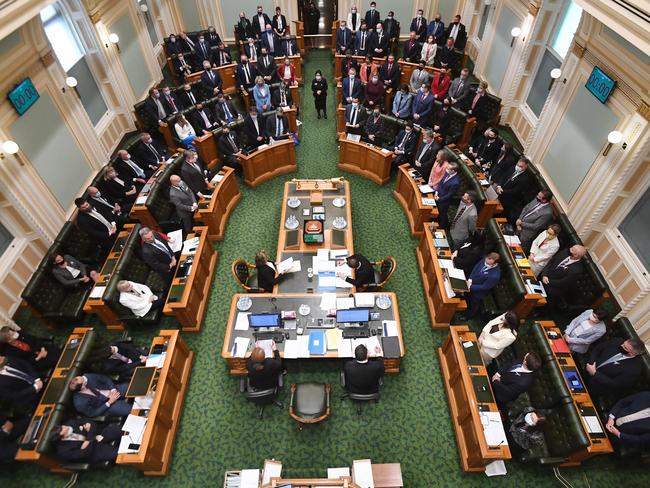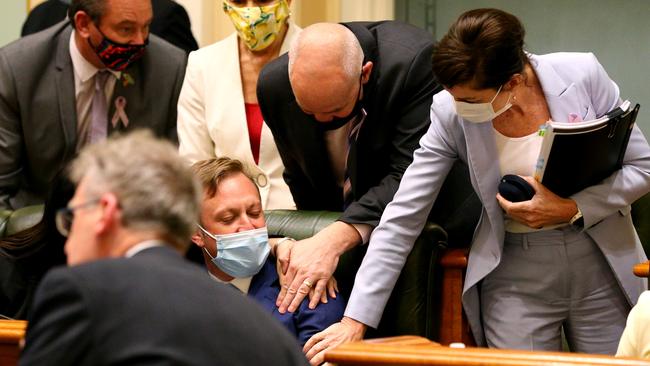Voluntary-assisted dying laws pass Queensland Parliament
The man who helped pass Australias first euthanasia laws almost 25 years ago has hailed Queensland’s voluntary assisted dying laws as the best he’s seen, after landmark legislation was passed by parliament.
QLD Politics
Don't miss out on the headlines from QLD Politics. Followed categories will be added to My News.
Voluntary assisted dying will become legal in Queensland following a historic and emotional victory in the state’s parliament.
From 2023 Queenslanders suffering a terminal illness that is expected to cause death within 12 months will be able to choose when to end their life.
Queensland’s 91 politicians – many who described the assisted dying vote as the most important they would ever cast – passed the landmark legislation on Thursday evening with a convincing 61-30 margin.
It makes Queensland the fifth Australian state to legalise voluntary assisted dying.
Three years of reports, public inquiries and community consultation culminated in cheers from the packed public gallery as the Speaker proclaimed the Bill passed.

Senior Palaszczuk Government Ministers could be seen signing each other’s copy of the Voluntary Assisted Dying Bill 2021.
Deputy Premier Steven Miles declared the legislation a milestone which would give people greater choice about how they exit this world.
“This is an important moment for our parliament and for Queensland,” he said.
“I want to dedicate this Bill to the many Queenslanders who supported laws like this but who died before seeing them debated here — Queenslanders like Peter Simpson and Duncan Pegg.”
In his closing speech on Wednesday night, Mr Miles singled out Labor’s Greenslopes MP Joe Kelly and Logan MP Linus Power – who along with Assistant Minister to the Premier Bart Mellish voted against the Bill – thanking the pair for their engagement.
Shadow Attorney-General and former Opposition leader Tim Nicholls and frontbenchers Sam O’Connor, Dale Last and Steve Minnikin were among 10 LNP MPs to support the proposal.
Advocates of euthanasia gathered outside parliament in anticipation of the consequential victory.
Clem Jones Trust chairman David Muir said there was an “overwhelming sense of relief” for terminally ill patients and their families.
“Terminally ill patients are the centrepiece of this legislation and their families too, this is for their benefit,” he said.
“For many years polling in the community has shown this legislation and this issue is very popular with around 80 per cent approval.”
However, Mr Muir said waiting until January 2023 for the legislation to come into effect caused “a tinge of sadness”.
Queensland Health will now be tasked with implementing the state’s voluntary-assisted dying scheme before the first patients are eligible.
Deputy Opposition Leader David Janetzki attempted to amend the Bill, introducing 54 clauses including the provision to expand conscientious objection to include doctors and health practitioners.
Mr Miles said the five pages of explanatory notes accompanying Mr Janetzki’s amendments “stand poorly as justification” when weighed next to the 880 pages of the Queensland Law Reform Commission report which formed the foundation of the Bill.
Present for Queensland’s vote was Former Northern Territory Chief Minister Marshall Perron, whose government passed Australia’s first euthanasia laws before they were overruled by the Commonwealth in 1997.
“I’ve tracked every bit of legislation on this issue in Australia for the last 26 years and this is the best I’ve seen,” he said.
“There has never been a more thoroughly researched, independently drafted Bill and it has taken into consideration issues flagged in other states, mainly Victoria.”

During the two-day debate hardened politicians were reduced to tears as they recalled holding the hand of a loved one as they drew their last breath.
Environment Minister Meaghan Scanlon was seven-years old when her father was diagnosed with cancer, recalling the day when his first “innocent looking freckle” was cut out – marking the start of a long and taxing battle with melanoma.
She said for six years her father’s health deteriorated as melanoma ripped holes in his bone and left his face paralysed from the cancer wrapping around his nerves, forcing them to be removed.
“I was 13-years-old when he finally died,” she said.
“When you grow up watching someone you love go through that, it cannot help but frame your understanding and empathy for those who are suffering and who die suffering far greater than he did.”
For 18 months Small Business Minister Di Farmer watched, powerless, as bowel cancer spread through her mother’s body.
“She went as far as she could to exercise her personal choice about the way she would die, but ultimately she could not make the choice about when and the way she would die,” Ms Farmer said.
An emotional Education Minister Grace Grace said members of her family had been “gasping and moaning” while laying on their deathbed, with desperate relatives ”begging the nurses to give them more morphine”.
While many MPs spoke of watching their parents and grandparents die, Stafford MP Jimmy Sullivan said he lived with “enduring grief” after the heartbreaking loss of his son.
“My experience with death in health care is, sadly, at the completely opposite end of a lifespan,” he said.
“I was determined to see that our great loss would mean that I have more compassion and empathy for those who also suffer, including those who grieve.”
Such was the significance of the issue, it was just the sixth conscience vote in Queensland’s parliament since 2000 and the second under the Palaszczuk Government after abortion was decriminalised with a vote of 50-41 in 2018.


